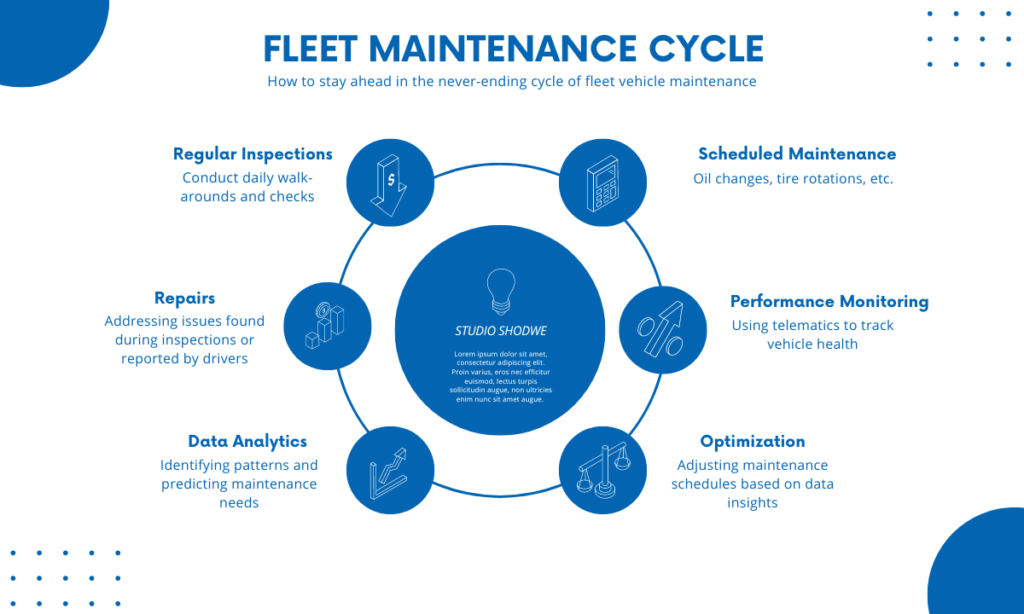Fleet management is the backbone of countless industries, from logistics to public services.
You’re about to discover how fleet management can transform your business. Stick around, and you’ll learn why 62% of GPS tracking users report a positive ROI on their fleet technology investments.
This comprehensive guide will explore the ins and outs of fleet management, its benefits, and how it can revolutionize your business operations.

1. What Is Fleet Management?
Fleet management is the systematic coordination and oversight of a company’s vehicle fleet. It encompasses:
- Vehicle acquisition and disposal
- Maintenance and repairs
- Fuel management
- Driver management and safety
- Regulatory compliance
- Route optimization
- Data analytics and reporting
The goal of fleet management is to improve efficiency, reduce costs, enhance safety, and maximize the return on investment for a company’s vehicle assets.
Fleet management has evolved from simple vehicle tracking to a sophisticated system integrating telematics, AI, and data analytics.
It’s no longer just about where your vehicles are – it’s about how they’re performing, how efficiently they’re being used, and how they’re impacting your bottom line.
2. Why Do Businesses Use Fleet Management?
You’re probably wondering, “What’s in it for me?” Well, here’s the quick take:
- Operational efficiency: Streamline your fleet operations and get more done with less.
- Cost reduction: Cut fuel costs, reduce maintenance expenses, and optimize vehicle utilization.
- Safety and compliance: Keep your drivers safe and stay on the right side of regulations.
- Real-time insights: Make data-driven decisions with up-to-the-minute information.
3. Key Benefits of Fleet Management
Let’s break down the benefits that’ll make you wonder how you ever managed without it:
- Improved vehicle tracking: Know where your assets are, 24/7.
- Enhanced driver safety: Reduce accidents and improve driver behavior.
- Better fuel management: Save up to 10% on fuel costs through optimization.
- Optimized routes: Get more deliveries done in less time.
- Increased profitability: Turn your fleet from a cost center into a profit driver.
Industries That Benefit from Fleet Management
| Industry | Key Benefits |
|---|---|
| Transport and Distribution | Route optimization, fuel savings |
| Public Transport | Schedule adherence, passenger safety |
| Oil and Gas | Asset tracking, compliance management |
| Emergency Services | Rapid response, vehicle readiness |
| Government Services | Cost reduction, transparency |
| Construction and Mining | Equipment utilization, site safety |
| Telecommunications | Service fleet efficiency, job scheduling |
No matter your industry, if you’ve got vehicles, you’ve got a reason to implement fleet management.
Key Features of Fleet Management Systems
Your fleet management system should be your command center. Here’s what to look for:
- Vehicle tracking and telematics
- Driving behavior analysis
- Electronic Logging Device (ELD) compliance
- Fuel management
- Route optimization
- Maintenance scheduling
- Reporting and analytics
The Role of a Fleet Manager
Fleet managers are the unsung heroes of the logistics world. They’re part strategist, part technologist, and part people person. Their job? To keep your fleet running like a well-oiled machine.
Key responsibilities include:
- Asset management
- Cost control
- Risk management
- Performance optimization
- Compliance oversight
Challenges in Fleet Management
Let’s face it – managing a fleet isn’t all smooth sailing. You’re going to hit some choppy waters. Here are some major hurdles you might face:
Rising Fuel Costs
Fuel often eats up a big chunk of your budget. With prices always on the move, it’s like trying to hit a moving target. You need to:
- Stay on top of market trends
- Implement fuel-efficient driving practices
- Consider alternative fuel options
Vehicle Maintenance Headaches
Keeping your fleet in tip-top shape is crucial, but it’s no walk in the park. You’re dealing with:
- Scheduling regular maintenance without disrupting operations
- Managing unexpected breakdowns
- Balancing preventive maintenance costs with potential downtime costs

Regulatory Compliance Nightmares
The rules of the road are always changing, and keeping up can feel like a full-time job. You’re juggling:
- Hours of Service (HOS) regulations
- Environmental standards
- Safety regulations
- Local, state, and federal laws
One slip-up could cost you big time, both in fines and reputation.
Driver Retention Struggles
Good drivers are worth their weight in gold, but keeping them can be tough. You’re up against:
- A competitive job market
- The challenges of life on the road
- The need for ongoing training and development
- Balancing fair pay with your bottom line
Retaining top talent is crucial for maintaining safety standards and operational efficiency.
Tech Adoption Resistance
New tech can revolutionize your fleet, but getting everyone on board isn’t always easy. You might face:
- Resistance from older drivers who are set in their ways
- The learning curve that comes with new systems
- Initial disruption to operations during implementation
- Concerns about privacy and monitoring
Data Overload
With modern telematics, you’ve got more data than ever. The real challenge is how to make sense of all the information you have at your fingertips:
- Sorting through mountains of information
- Identifying what’s actually important
- Translating data into actionable insights
- Ensuring data accuracy and reliability
With the right strategies and tools, you can overcome these challenges. It’s about being proactive, staying informed, and leveraging technology to your advantage.
Remember, every challenge is an opportunity in disguise. By tackling these issues head-on, you can streamline your operations, cut costs, and gain a competitive edge. It’s not about having a perfect fleet – it’s about continuous improvement and adaptation.
Learn how to audit your fleet to identify and address these challenges effectively. With the right approach, you can turn these hurdles into stepping stones for success.
Selecting the Right Fleet Management Software
Choosing the right software is crucial. Look for:
- Scalability
- User-friendliness
- Integration capabilities
- Mobile access
- Robust reporting
Remember, the best software is the one that fits your specific needs and helps you hit your KPIs.
Frequently Asked Questions (FAQs)
- What’s the main purpose of fleet management?
To optimize fleet operations, reduce costs, and improve efficiency. - How does fleet management cut costs?
Through better route planning, fuel management, and maintenance scheduling. - Is fleet management software secure?
Top providers offer bank-level encryption and secure data centers. - How does it improve driver safety?
By monitoring driving behavior and providing real-time feedback. - What’s fleet utilization and why does it matter?
Fleet utilization measures how effectively your vehicles are being used. It’s key to maximizing ROI.
Get started with expert fleet management solutions today and drive your business towards a more efficient, profitable future.
Ready to take your fleet to the next level? Don’t get left behind.
Explore your options, choose the right solution, and watch your fleet transform from a cost center into a strategic asset.